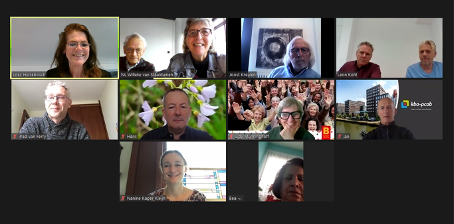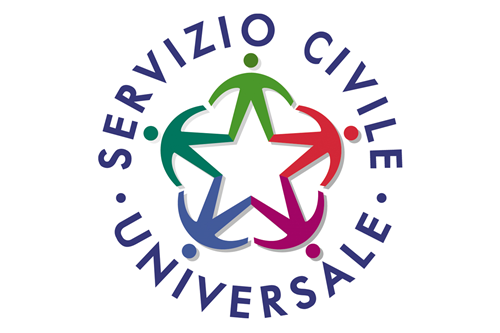News
Documentation of our Bridge the Gap! Online Final Event
- Susanne Dobner
- October 05, 2022
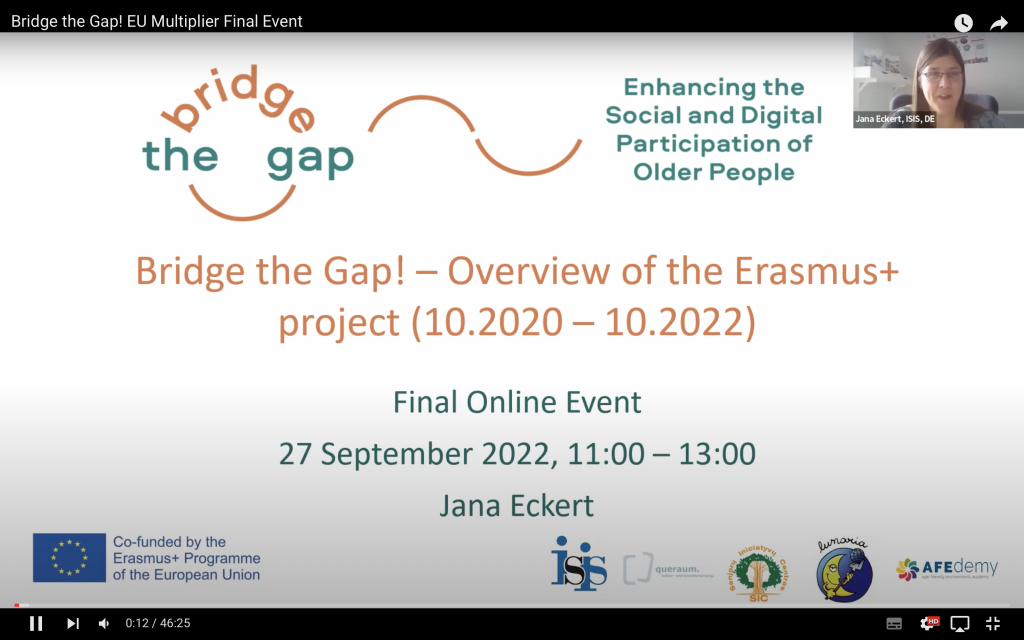
Thank you for participating in our Bridge the Gap! Final Online Event on September 27th!
It was a pleasure to share and discuss our learnings and reflections with all of you! We are happy to now share the documentation of the final event. Please find a link to the recordings of our presentations about the project and insights into the activities in all five Bridge the Gap! countries (Austria, Germany, The Netherlands, Italy, Lithuania).
Here is also the presentation of the Time-to-care project in Italy, presented during a break-out session by Greta Barbolini. Enjoy watching and reading, best wishes from the Bridge the Gap! project team!
Bridge the Gap! information event in Bad Vilbel
- Marcel Neumann
- September 29, 2022
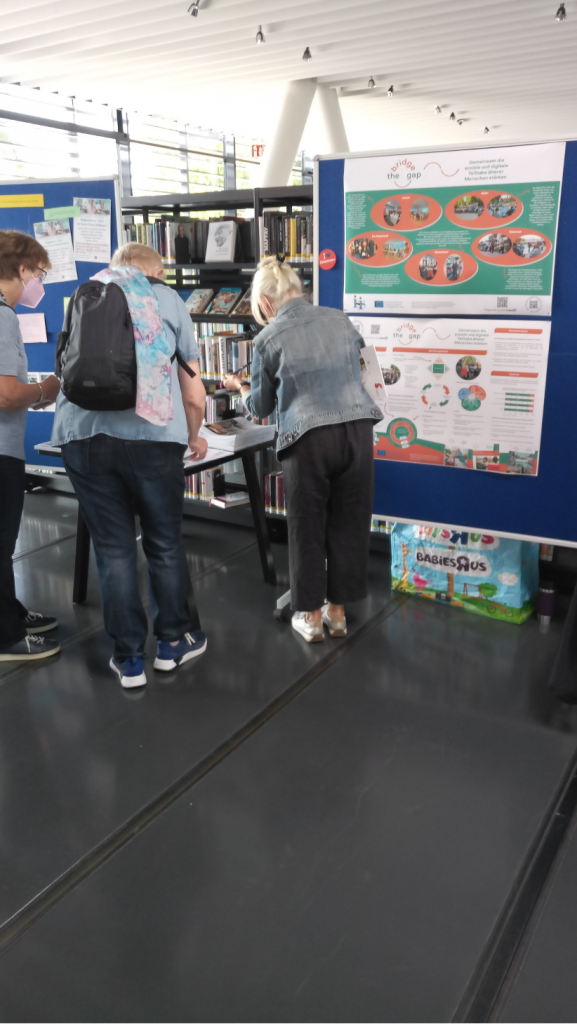


What became clear during the later discussion over coffee and cake is that in order to reach older people in the area of digital education in the future, existing offers must be further expanded. For example, it was mentioned that in addition to “beginner topics” such as search engines, browsers or basic functions of smartphones, many older people also demand advanced content such as cyber security or data protection, which is why a gradation of existing offers from easy to difficult was also put forward as an idea. At the same time, one of the major barriers discussed was that the identification of specific needs in the digital field is a challenge. For this reason, thematic/content-related orientation aids should be produced and the individual advantages of using digital technology should be emphasised.
Overall, the participants emphasised that those involved in the project were very committed and interested, which further underlines the importance of further training to develop digital skills of older people at the local level. Adult educators and volunteers from other cities were also inspired by the project activities in Germany and other countries.
Bridge the Gap! Final
Online-Event
Tuesday, 27th September 2022, 11:00-13:00
- Susanne Dobner
- September 12, 2022
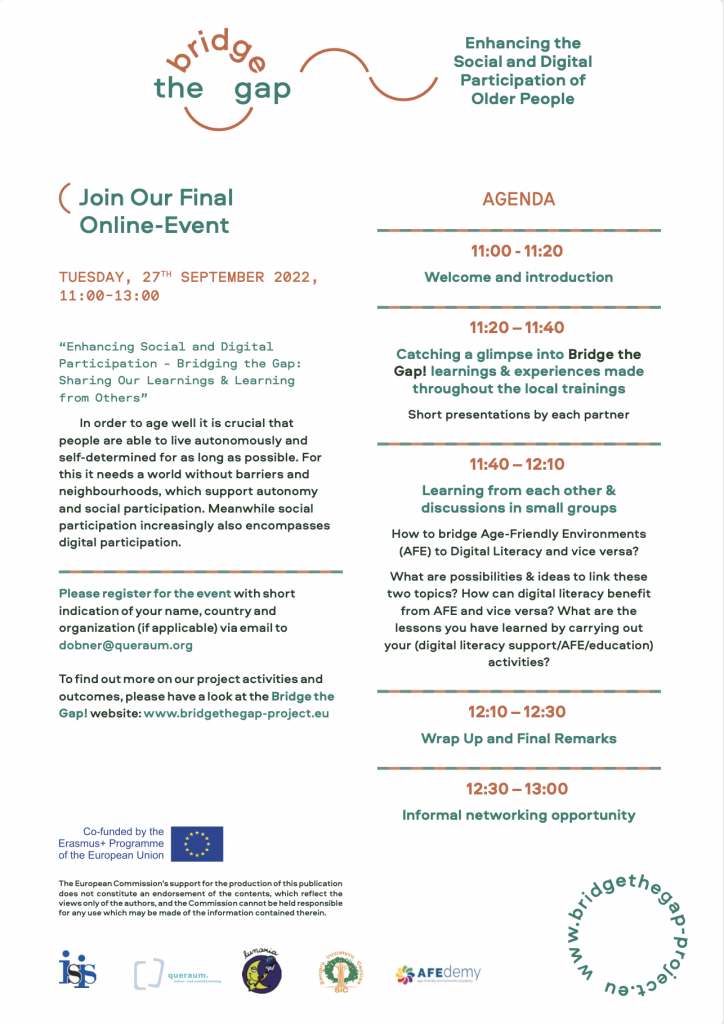
Bridge the Gap! at the Time To Care digital literacy training (2)
- Sergio Andreis
- March 28, 2022
Training Contents, Methods and Materials
Modules
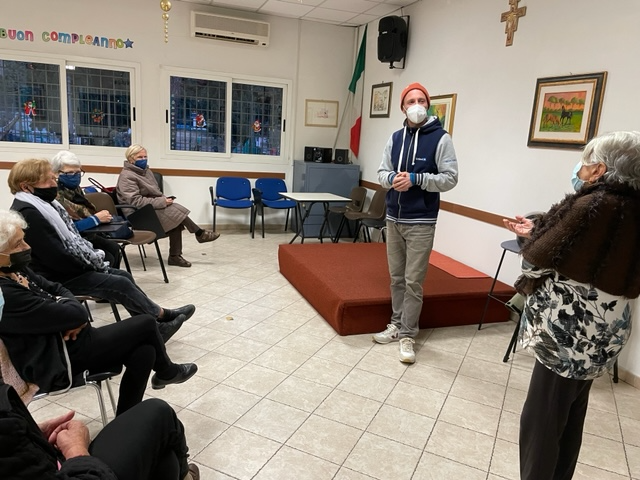
Methods
Bridge the Gap! at the Time To Care digital literacy training (1)
- Sergio Andreis
- March 28, 2022
The second edition of the Bridge the Gap! Newsletter is online!
- Welela Samson
- February 10, 2022
We invited older citizens to discuss possibilities for improving social and digital participation of older people and to get to know new digital tools that can be useful for their own projects. This also served as a testing ground for our curriculum and we were able to finetune it with the help of their valuable feedback. Our next step will be the development of the Bridge the Gap! Training Kit, that will be available for interested trainers, such as adult educators and volunteers in organisations that work with older people.
You can download our newsletter in multiple languages here.
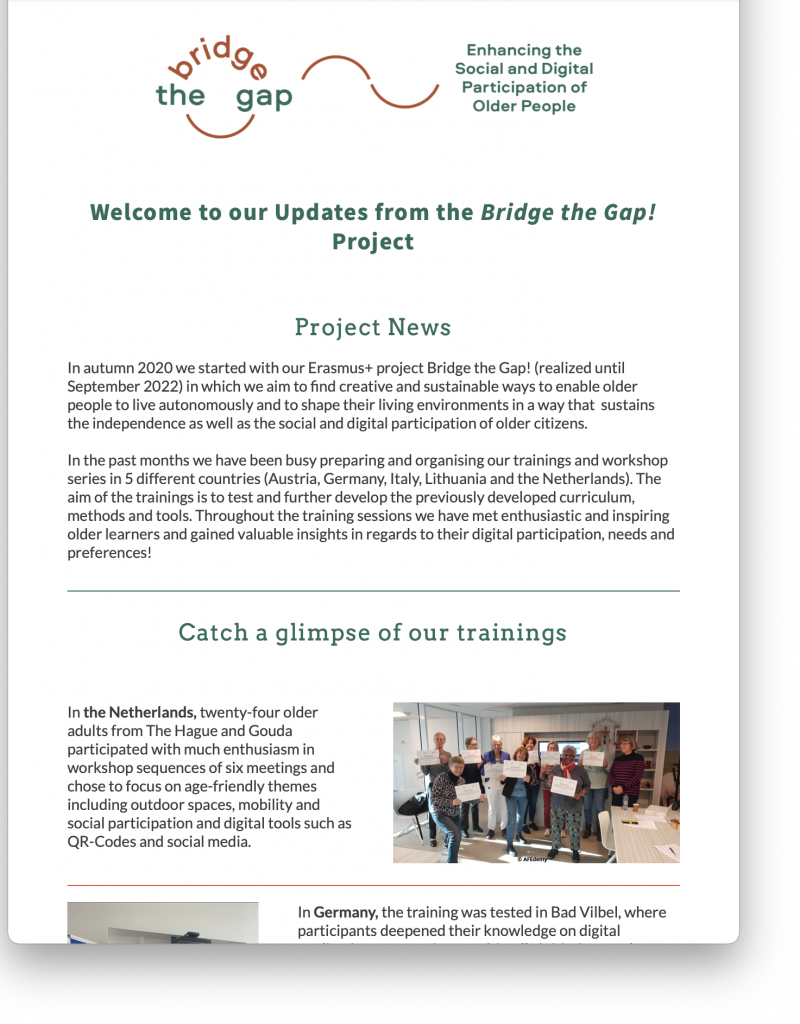
Successful approach to train digital skills with older adults
- Willeke van Staalduinen
- January 19, 2022
Twenty-four older adults from The Hague and Gouda participated with much enthusiasm in a workshop sequence of six meetings and indicated afterward that the training improved their digital skills. In this article will be described what the success formula was to book real results.
See articles in English and Dutch:
Finalization of test training series in Germany
- Jana Eckert
- December 16, 2021
photo © ISIS gGmbH
As part of the Bridge the Gap! project, from mid-August 2021 to mid-November 2021, a series of workshops took place in Bad Vilbel near Frankfurt/Main, organised by ISIS Institut für Soziale Infrastruktur with the support of the Seniors’ Office and the City Library, with the cooperation of the Neighbourhood Association and the Seniors’ Council. The participants first learned in three workshops, among other things, how digital tools can facilitate age-friendly initiatives and were given the opportunity to deepen their knowledge regarding digital applications such as MS Publisher, image databases or image editing programmes. The participants worked together in a project group on the “expansion of offers to promote the digital competence of older people” and planned in several project group meetings, among other things, the expansion of the smartphone consultation hour of the neighbourhood association, which will be offered in different neighbourhoods in the future and thus be more accessible for many people. The knowledge about digital tools acquired in the workshops helped to create an information flyer that informs about the offers in the digital field. In the final workshop, the participants exchanged their experiences, reflected on their work on the local project and evaluated the workshop series.
The participants particularly appreciated having made contacts through the workshop series and having gained new impulses and ideas. With regard to the work on the local project, it was emphasised that the work done so far is only seen as the first steps towards expanding the offers, which will also be continued after the end of the workshop series.
Trainings in the Netherlands concluded
- Willeke van Staalduinen
- December 16, 2021
photos © AFEdemy
In The Netherlands, the Dutch partner AFEdemy, established three groups for testing and training the Bridge the Gap! curriculum. 24 older adults in the age of 64-85 years successfully finalised the training sequence of 6 workshops. During the workshops the learners brought their own smartphones and tablets (iOS and Android) to work on.
Quotes
I have learned…
…. to search for websites and to get information from it
…. to download apps, such as CoronaCheck App
…. to work with my digital identification number
…. not to be afraid to go digital
…. to use my phone
Conclusions
Social and digital participation is a highly relevant theme among older adults
Much demand after this kind of trainings
Already a follow-up started: analphabetic people learn to use the speak functionality on the device and reading-out-loud function of websites
Digital accessibility is utmost important
A Neighbourhood Walk and 60+ Check kicked off the trainings series in Vienna!
- Susanne Dobner
- November 01, 2021
photos © Voglhuber
Bridge the Gap! trainings in Germany
- Jana Eckert
- October 10, 2021
photos © ISIS gGmbH
Since August 2021, the German project partner ISIS is testing the training developed within the Bridge the Gap! project in Bad Vilbel. Within the training, the participants jointly develop projects that contribute to make their living environment more age-friendly. This includes in particular measures that strengthen the autonomy of older adults and promote their participation in all areas of life. In addition to getting to know each other and learning units on digital tools and the concept of age-friendly environments, the focus of the workshops conducted so far has been on finding ideas for their own projects. The participants exchanged ideas, also with guest speakers, in particular on how the offers to promote the digital literacy of older citizens can be extended.
The aim for the further work of the participants is to concretise and implement these ideas. We are looking forward to the upcoming meetings and workshops, the exciting exchange with each other and the creative projects that will be developed!
Seniors Initiatives Centre in Kaunas started Bridge the Gap!
- Edita Šatienė
- September 15, 2021
photos © Edita Šatienė
Seniors Initiatives Centre started Bridge the Gap! Project training on August 31. The training takes place in Šilainiai and Šančiai branches of Kaunas City Public Library. 16 older citizens from Šilainiai and Šančiai districts enrolled in the training course in response to wide promotion on social media channels. The training is organized in weekly sessions for two groups of 8 people aged 70+. The first session was used to introduce the project idea and the training curriculum, to evaluate the motivation, experience and expectations of the participants and to practice joining a Zoom class. The participants also practiced the public transport App Trafi in order to find the way to the consumer electronics retail store Avitela. The second session took place there to introduce the participants to smart home technology appliances and gadgets. The third session is planned to give the participants a virtual reality experience in VR Experience Room. After taking a look at digital technologies all around us, the training will continue in the libraries until the middle of October.
UN International Day Of Older Persons 2021
- Susanne Dobner
- September 15, 2021

Click here for the ZOOM invitation and link!
The first edition of our Bridge the Gap! Newsletter is online
- Welela Samson
- July 21, 2021
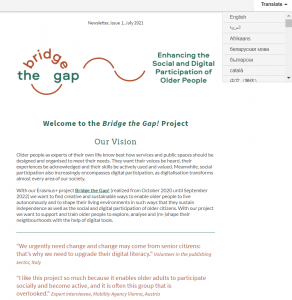
So far, we have collected our research findings in our national reports and assembled a shorter overview in our fact sheet. In addition to that, we have consulted with experts and older people to help us design appropriate training plans. Next, we will start the training test phase in all partner countries. In our workshops, we will support older people in creating ideas, building networks and starting age-friendly projects based on their own interests and needs.
Feel free to look around our project website and to download our newsletter and further resources in multiple languages here.
Project presentation in the municipal library in Bad Vilbel, Germany
- Julia Sterk
- July 21, 2021
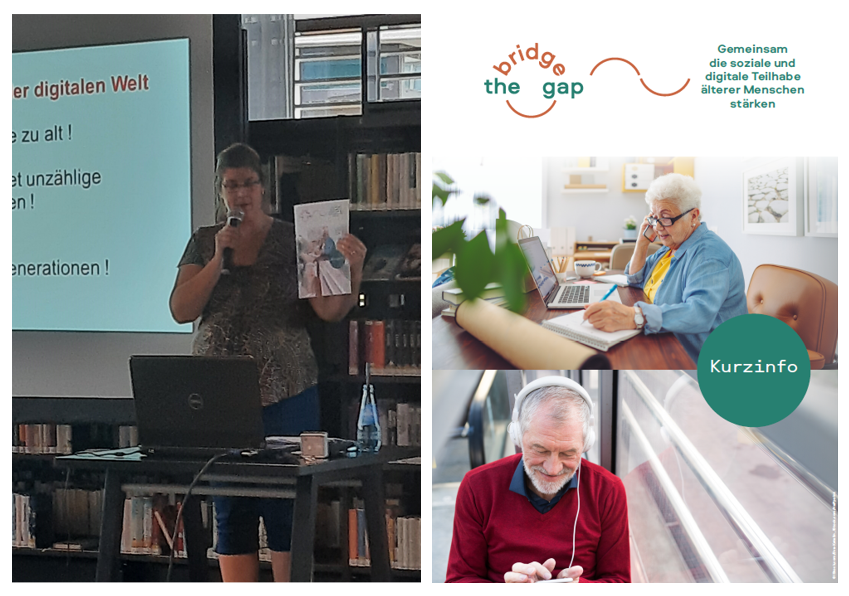
The kick-off event of the lecture series on digital topics for older people took place on 12 July 2021. Lidia Burhard from the Senior Citizens’ Office in Bad Vilbel led the event. The number of participants was limited to 40 due to Covid-19, although the interest and the number of registrations were much higher. Offers of the Neighbourhood Association Bad Vilbel to support older people in using digital technologies were presented at the event. Angelika Welscher, a volunteer of the Neighbourhood Association, presented an overview of useful applications of digital technologies in her lecture using the example of planning a holiday trip. She also presented a variety of other helpful tips for everyday life. In addition to the lecture, Jana Eckert presented the most important information and aims of Bridge the Gap! and distributed the fact sheet to those interested. She also informed about the planned workshops to be held in Bad Vilbel and invited the audience to participate.
We are looking forward to test the BTG training in Bad Vilbel soon.
Our new Bridge the Gap! Fact Sheet is now online
- Julia Sterk
- July 14, 2021
Bridge the Gap! in Rome Municipality II
- Mara Petrocelli, Lunaria Communication
- June 18, 2021
photos © Angela Pagano, Lunaria
Europe's Digital Decade: Commission launches consultation and discussion on EU digital principles
- Sergio Andreis
- June 09, 2021

Co-creation session to set-up the training curriculum
- Willeke van Staalduinen
- April 13, 2021
